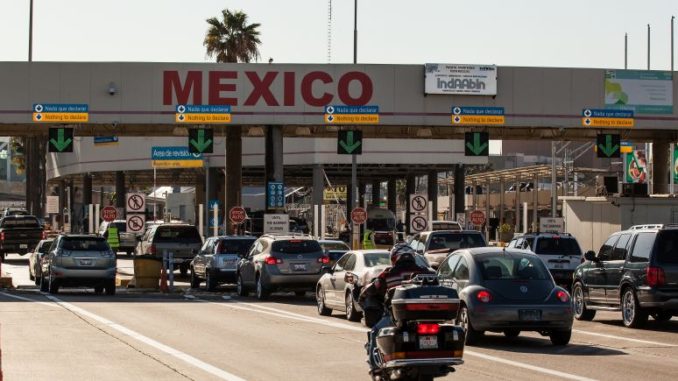
Much attention has been given to recent lawsuits demanding that the Trump administration continue to provide benefits associated with the DACA program started by President Obama. Here are some of the headlines:
Another federal judge rules against Trump move to end DACA (USA Today)
Third judge rules against Trump move to end DACA (Politico)
Third federal judge issues strongest ruling yet backing DACA (NBC News)
With all of the attention that those cases were given, it could be surprising that another lawsuit hasn’t been given much attention. That would be a lawsuit filed three days ago, on May 1st. From the Texas Tribune:
Texas Attorney General Ken Paxton filed a lawsuit Tuesday to end the Deferred Action for Childhood Arrivals program, leading a seven-state coalition against an Obama-era immigration measure that protects hundreds of thousands of immigrants nationwide from deportation, including more than 120,000 in Texas.
This would seem to be unimportant… after all, they’re filing a suit on a matter that has already been supported by three federal judges… save for two facts. First, that a judge in Maryland has already issued a ruling contrary to that of the other three, setting the stage for further legal fighting (Washington Examiner). Second, and more importantly, that Ken Paxton has made similar arguments under similar conditions before… that led to the end of DAPA, DACA’s related program.
From the New York Times, Dec. 3, 2014:
Texas and 16 other states filed a federal lawsuit on Wednesday challenging President Obama’s executive actions on immigration, arguing that he violated his constitutional duty to enforce the laws and illegally placed new burdens on state budgets.
………….
(F)our lawyers who formerly served as general counsel to the immigration agency that will run the new programs said their “collective view” was that Mr. Obama was “well within his legal authority.”
Was he, though? The courts decided. From the New York Times, June 23, 2016:
The Supreme Court announced on Thursday that it had deadlocked in a case challenging President Obama’s immigration plan, effectively ending what Mr. Obama had hoped would become one of his central legacies. The program would have shielded as many as five million undocumented immigrants from deportation and allowed them to legally work in the United States.
The court was able to deadlock because of Antonin Scalia’s untimely death. The additional jurist to be seated on the bench during the interim is Neil Gorsuch. Based on a recent ruling by Gorsuch siding with the liberal wing of the court on an immigration case, that might be worrisome. But as Slate noted:
In her opinion for the court, Kagan explained that this decision flows logically from the court’s ruling in 2015’s Johnson v. United States. That decision, written by Scalia, found that a similarly worded criminal statute was too vague to comport with due process. The government argued that this case is different from Johnson because it involved a civil statute rather than a criminal one.
Basically, Gorsuch disagreed with Thomas on the relative validity of intentionally vague laws. While this might signal a move left for Gorsuch, it would also be a result of someone trying to stand against continued governmental encroachment upon individual liberties. There is a reasonable likelihood that Gorsuch would be amenable to restricting Presidential overreach and restoring power over immigration law to the Congress.
Texas knows this. After the successful lawsuit against DAPA, the Texas government made it clear they were willing to pursue a similar action on DACA. Decisions were made to hold off on filing the lawsuit so as to not create a political issue during the 2017 election season. Then, after Trump won, the decision was made to continue to hold off and let Trump, as President, follow through on his campaign promise to rescind DACA.
Months passed. In June, Texas threatened it would file a lawsuit similar to the one which had eliminated DAPA. (El Paso Times)
Then came September, 2017. Texas had waited long enough. It was time for the Return of the DACA lawsuit… and Trump decided to end DACA to prevent them from filing it. From the Washington Post:
In an appearance in a seventh-floor conference room at the Justice Department, Sessions said “imminent litigation” from the state of Texas and others prompted a review of the so-called Deferred Action for Childhood Arrivals program, commonly referred to as DACA. After that review, officials concluded that the program was “an unconstitutional exercise of authority by the executive branch,” Sessions said.
That was months ago. Since the program has been “ended”, lawsuits have been working through the legal system. The administration has presented its defense of ending the program, but despite the Supreme Court ruling to end DAPA and the Constitutional authoity questions, it has managed to lose the bulk of the cases.
One might almost suspect that the administration of a man who advocated for giving DREAMers citizenship (Reuters) doesn’t really want to win the cases it’s defending.
Then, on May first, the Texas DACA lawsuit was finally filed.
It would seem that at least eight states do want the program to end, and for both border enforcement and separation of powers to have meaning.
